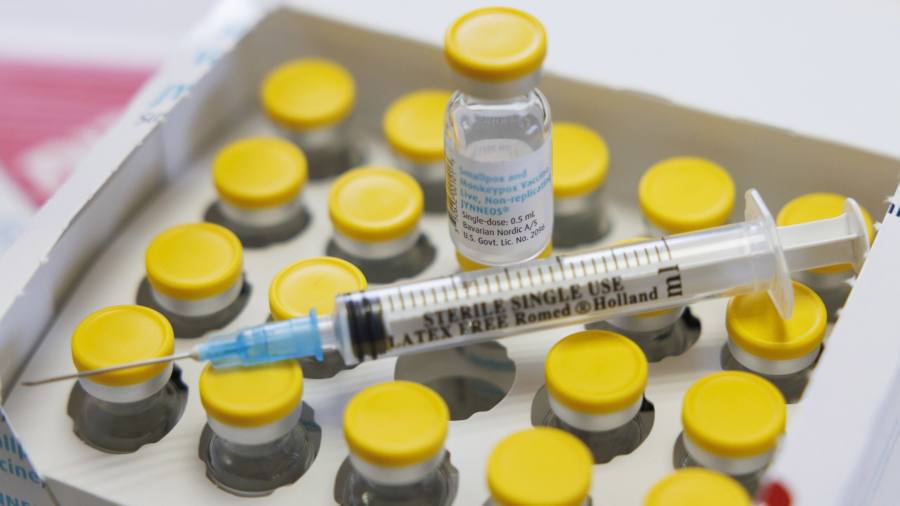
Bavarian Nordic has sold its monkeypox vaccine for between $70 and more than $300 a dose, according to a person familiar with the matter, pushing the small Danish biotech company close to break-even this year.
Paul Chaplin, president and chief executive, said on Wednesday that these were “exciting times” for the drugmaker as it recorded “all-time high revenues” in the nine months to September. Shares were up 7 per cent after results on Wednesday, having more than doubled since the global monkeypox outbreak started in May.
He was “highly encouraged to see how our vaccines can truly make a difference by providing comfort for the populations at risk and helping to change the course of the monkeypox outbreak”. He declined to comment on the price.
Vaccine orders pushed revenues to DKr1.86bn ($251mn) during the period, up from DKr1.35bn a year ago, the company said, with earnings before interest, tax, depreciation and amortisation at DKr14mn.
“We’ve broken even before,” Chaplin told the Financial Times. “Since 2020 we have the ambition to be a profitable company with the caveat that when we had large [late-stage studies] we may not be able to be profitable, and that’s what we were guiding for originally in 2022 . . . With the growth of rabies and monkeypox [vaccine sales] we’ve turned that around to what hopefully will end up being a break-even result” by year’s end.
The price range for a single dose of the vaccine can be between $70 and more than $300, depending on order size and commercial agreements between the drugmaker and the country buying it, according to a person familiar with the matter. The US, for example, has heavily contributed to the development of the shot, initially devised against smallpox, and enjoys a “unique” price.
Wednesday’s figures underscore the previously relatively unknown biotech’s rise to prominence this year as cases of monkeypox surged in the Global North, where the disease had not been endemic previously. But activists, including advocacy group Public Citizen, have said the jab’s high price may have put it beyond the means of poorer nations where the disease has traditionally circulated.
Chaplin said this was “possibly” the case, though he insisted the company had been fair. “All organisations or countries that have asked for doses we have supplied doses or will be supplying doses to this year,” he said. “We haven’t turned anyone away . . . There hasn’t been a lot of demand from sub-Saharan Africa.”
“If a country really wanted to have access to our vaccine they should at least contact Bavarian Nordic and see what’s possible,” he said, adding that the company would not block richer countries from donating doses to poorer nations.
“It’s important for us that our vaccine gets out there and is used to contain the outbreak,” Chaplin said, noting that more than 1mn people had received the shot globally. “Of course we’re also a company, we have to make money.”
Bavarian Nordic has access deals in place with Latin American countries, including through the World Health Organization.
Monkeypox cases are on the wane globally, though authorities have repeatedly warned against complacency that could lead to another wave in the future. The vast majority of cases have been recorded in networks of men who have sex with men.
Several countries experienced shortages of monkeypox vaccine this year, including the UK, where authorities refused official advice to procure more doses to hedge against a potential resurgence of the disease, the FT has reported.